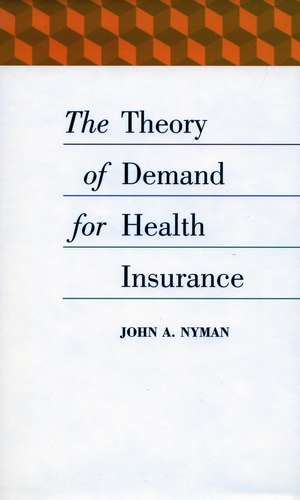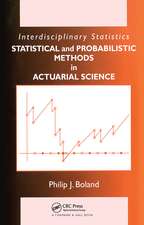The Theory of Demand for Health Insurance
Autor John Nymanen Limba Engleză Hardback – 31 oct 2002
Why do people buy health insurance? Conventional theory holds that people purchase insurance because they prefer the certainty of paying a small premium to the risk of getting sick and paying a large medical bill. Conventional theory also holds that any additional health care that consumers purchase because they have insurance is not worth the cost of producing it. Therefore, economists have promoted policies—copayments and managed care—to reduce consumption of this additional, seemingly low-value care.
This book presents a new theory of consumer demand for health insurance. It holds that people purchase insurance to obtain additional income when they become ill. In effect, insurance companies act to transfer insurance premiums from those who remain healthy to those who become ill. This additional income generates purchases of additional high-value care, often allowing sick persons to obtain life-saving care that they could not otherwise afford.
Regarding risk, the new theory relies on empirical studies showing that consumers actually prefer the risk of a large loss to incurring a smaller loss with certainty. Therefore, if consumers purchase insurance, it is not because they desire to avoid risk. Instead, the new theory suggests consumers simply pay a premium when healthy in exchange for a claim on additional income (effected when insurance pays for the medical care) if they become ill.
Health insurance is substantially more valuable to the consumer under the new theory. The new theory moreover implies that copayments and managed care—central health policies of the last 30 years—were directed at solving problems that largely did not exist. Because these policies either reduced the amount of income transferred to ill persons or limited access to valuable health care, they may have done more harm than good. The new theory also provides a solid theoretical justification for insuring the uninsured and for implementing national health insurance.
This book presents a new theory of consumer demand for health insurance. It holds that people purchase insurance to obtain additional income when they become ill. In effect, insurance companies act to transfer insurance premiums from those who remain healthy to those who become ill. This additional income generates purchases of additional high-value care, often allowing sick persons to obtain life-saving care that they could not otherwise afford.
Regarding risk, the new theory relies on empirical studies showing that consumers actually prefer the risk of a large loss to incurring a smaller loss with certainty. Therefore, if consumers purchase insurance, it is not because they desire to avoid risk. Instead, the new theory suggests consumers simply pay a premium when healthy in exchange for a claim on additional income (effected when insurance pays for the medical care) if they become ill.
Health insurance is substantially more valuable to the consumer under the new theory. The new theory moreover implies that copayments and managed care—central health policies of the last 30 years—were directed at solving problems that largely did not exist. Because these policies either reduced the amount of income transferred to ill persons or limited access to valuable health care, they may have done more harm than good. The new theory also provides a solid theoretical justification for insuring the uninsured and for implementing national health insurance.
Preț: 438.92 lei
Nou
Puncte Express: 658
Preț estimativ în valută:
84.01€ • 87.37$ • 70.40£
84.01€ • 87.37$ • 70.40£
Carte disponibilă
Livrare economică 21 februarie-07 martie
Preluare comenzi: 021 569.72.76
Specificații
ISBN-13: 9780804744881
ISBN-10: 0804744882
Pagini: 216
Dimensiuni: 152 x 229 x 20 mm
Greutate: 0.42 kg
Ediția:1
Editura: Stanford University Press
Colecția Stanford Economics and Finance
ISBN-10: 0804744882
Pagini: 216
Dimensiuni: 152 x 229 x 20 mm
Greutate: 0.42 kg
Ediția:1
Editura: Stanford University Press
Colecția Stanford Economics and Finance
Recenzii
“This book thoroughly and critically re-examines two core beliefs in health economics: that health insurance induces individuals to overconsume care and that the demand for insurance is primarily driven by individuals' desire to avoid risk. It concludes that much of the increase in health care expenditures associated with insurance does not diminish welfare and that individuals' desire to increase their ability to afford health care when they fall ill is an important motivator for the purchase of health insurance. These ideas, though perhaps controversial, offer important insights to scholars and teachers working in this area and have important ramifications for policy makers and health care purchasers as they strive to constrain health care cost growth.”—Michael Chernew, University of Michigan
“This is a compelling and modern treatment of the demand for health insurance written by a leader in the field. The book is concise yet comprehensive, carefully researched, and clear. It is must reading for anyone interested in understanding alternative theories of the demand for health insurance, as well as the policy implications of these alternative theories.”—John A. Rizzo, The Ohio State University
Notă biografică
John A. Nyman is Professor of Health Services Research and Policy at the University of Minnesota.
Textul de pe ultima copertă
“This book thoroughly and critically re-examines two core beliefs in health economics: that health insurance induces individuals to overconsume care and that the demand for insurance is primarily driven by individuals' desire to avoid risk. It concludes that much of the increase in health care expenditures associated with insurance does not diminish welfare and that individuals' desire to increase their ability to afford health care when they fall ill is an important motivator for the purchase of health insurance. These ideas, though perhaps controversial, offer important insights to scholars and teachers working in this area and have important ramifications for policy makers and health care purchasers as they strive to constrain health care cost growth.”—Michael Chernew, University of Michigan
“This is a compelling and modern treatment of the demand for health insurance written by a leader in the field. The book is concise yet comprehensive, carefully researched, and clear. It is must reading for anyone interested in understanding alternative theories of the demand for health insurance, as well as the policy implications of these alternative theories.”—John A. Rizzo, The Ohio State University
“This is a compelling and modern treatment of the demand for health insurance written by a leader in the field. The book is concise yet comprehensive, carefully researched, and clear. It is must reading for anyone interested in understanding alternative theories of the demand for health insurance, as well as the policy implications of these alternative theories.”—John A. Rizzo, The Ohio State University
Descriere
Why do people buy health insurance? Conventional theory holds that people purchase insurance because they prefer the certainty of paying a small premium to the risk of getting sick and paying a large medical bill. This book presents a new theory of consumer demand for health insurance. It holds that people purchase insurance to obtain additional "income" when they become ill.











